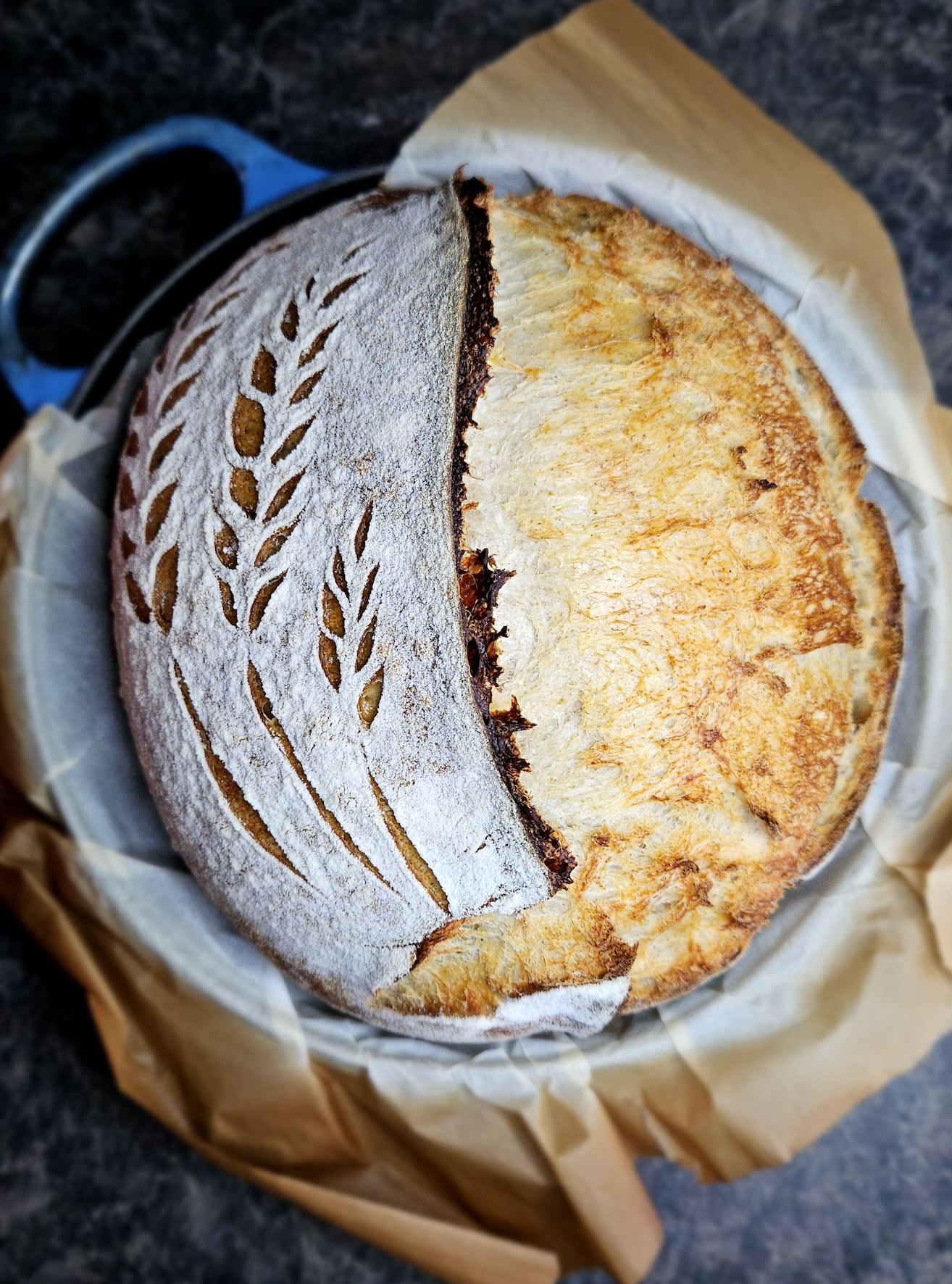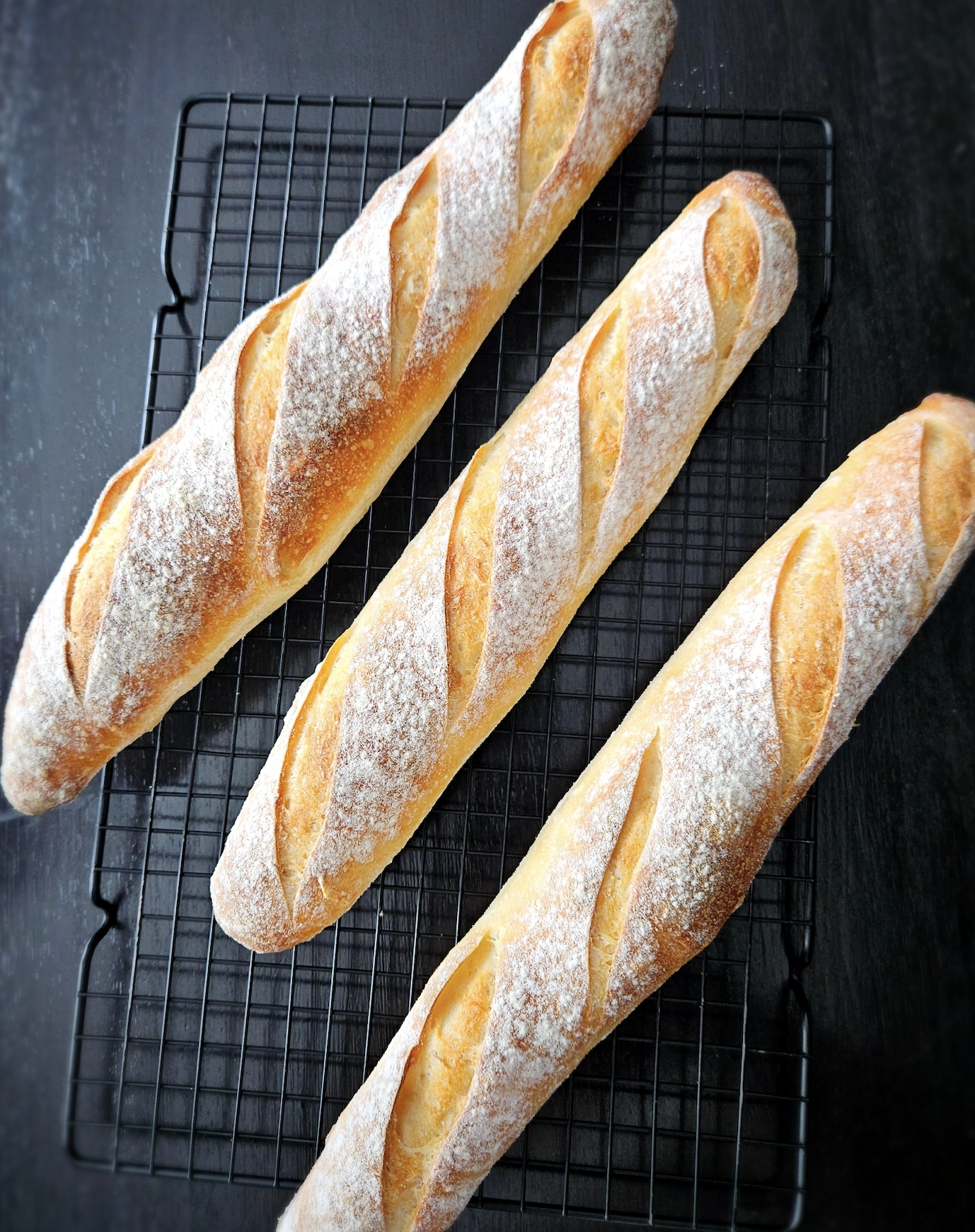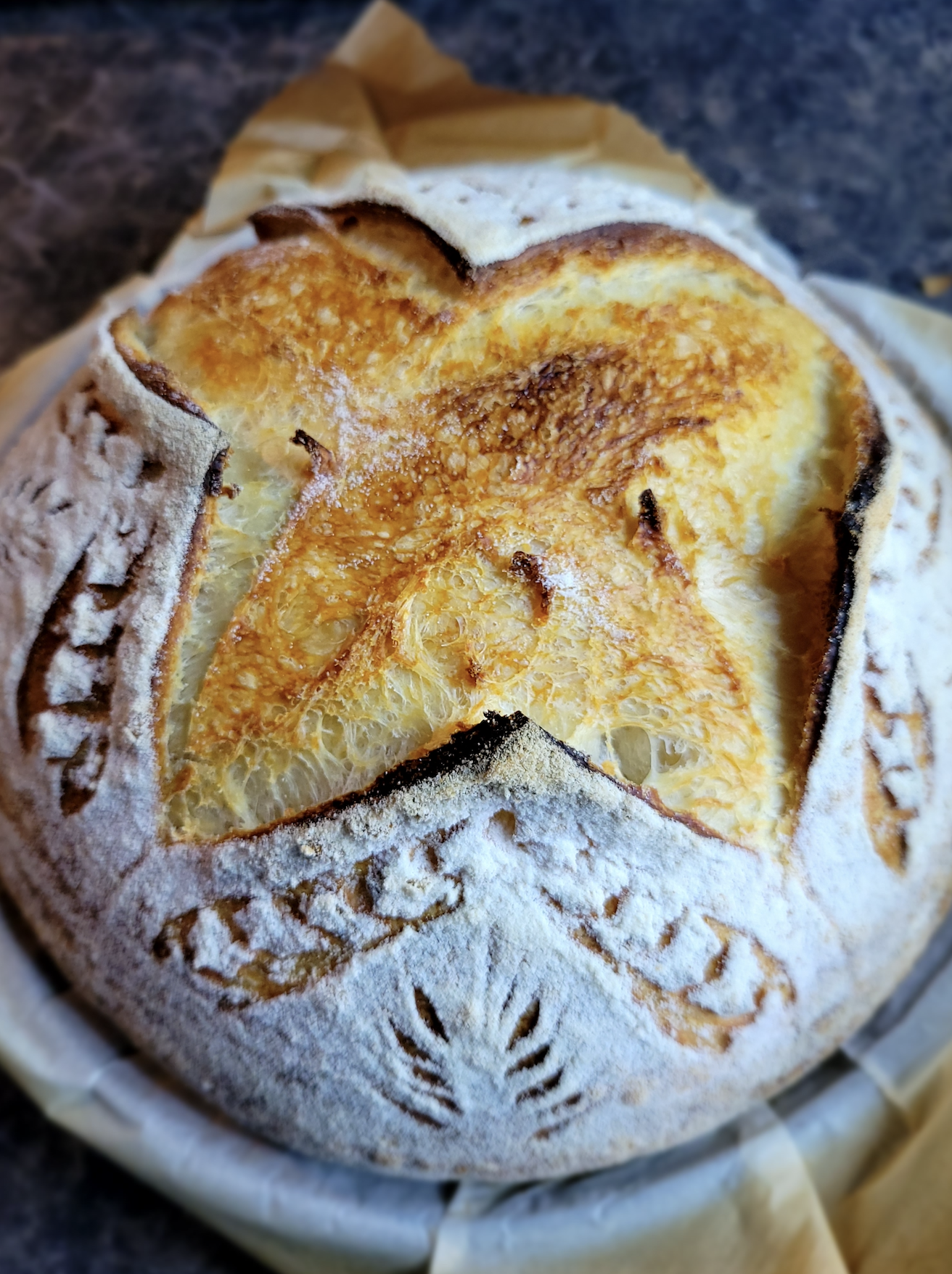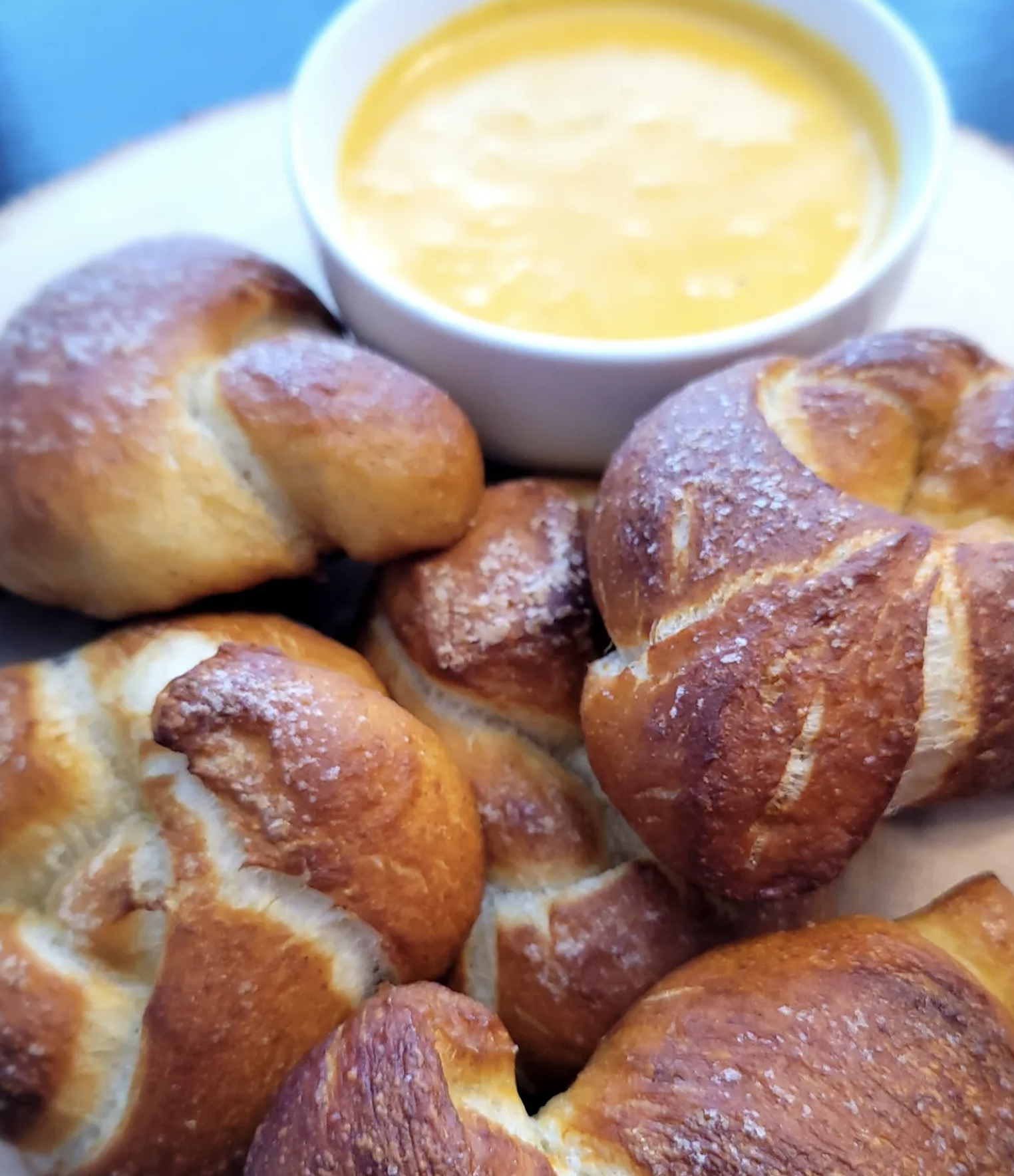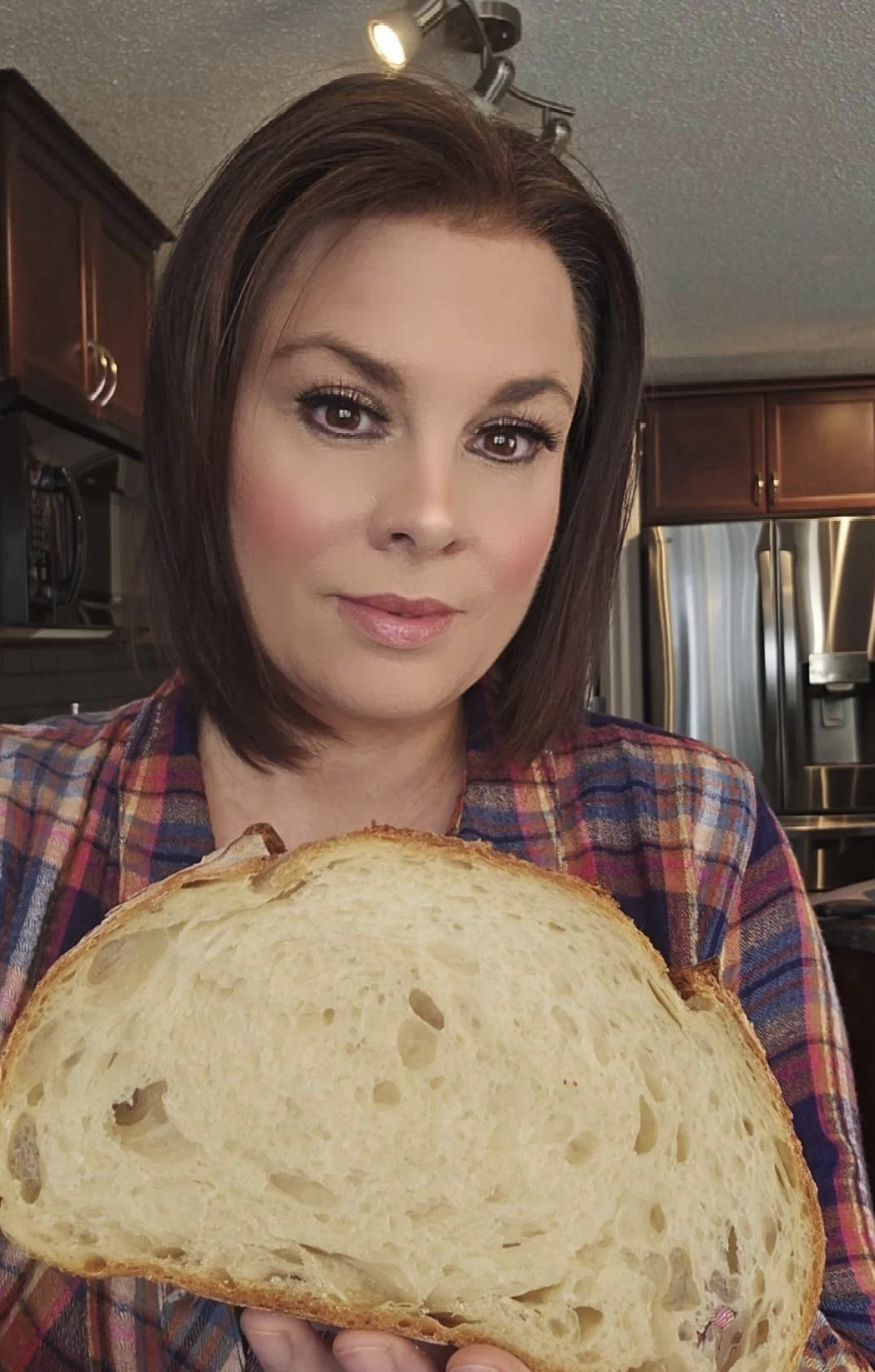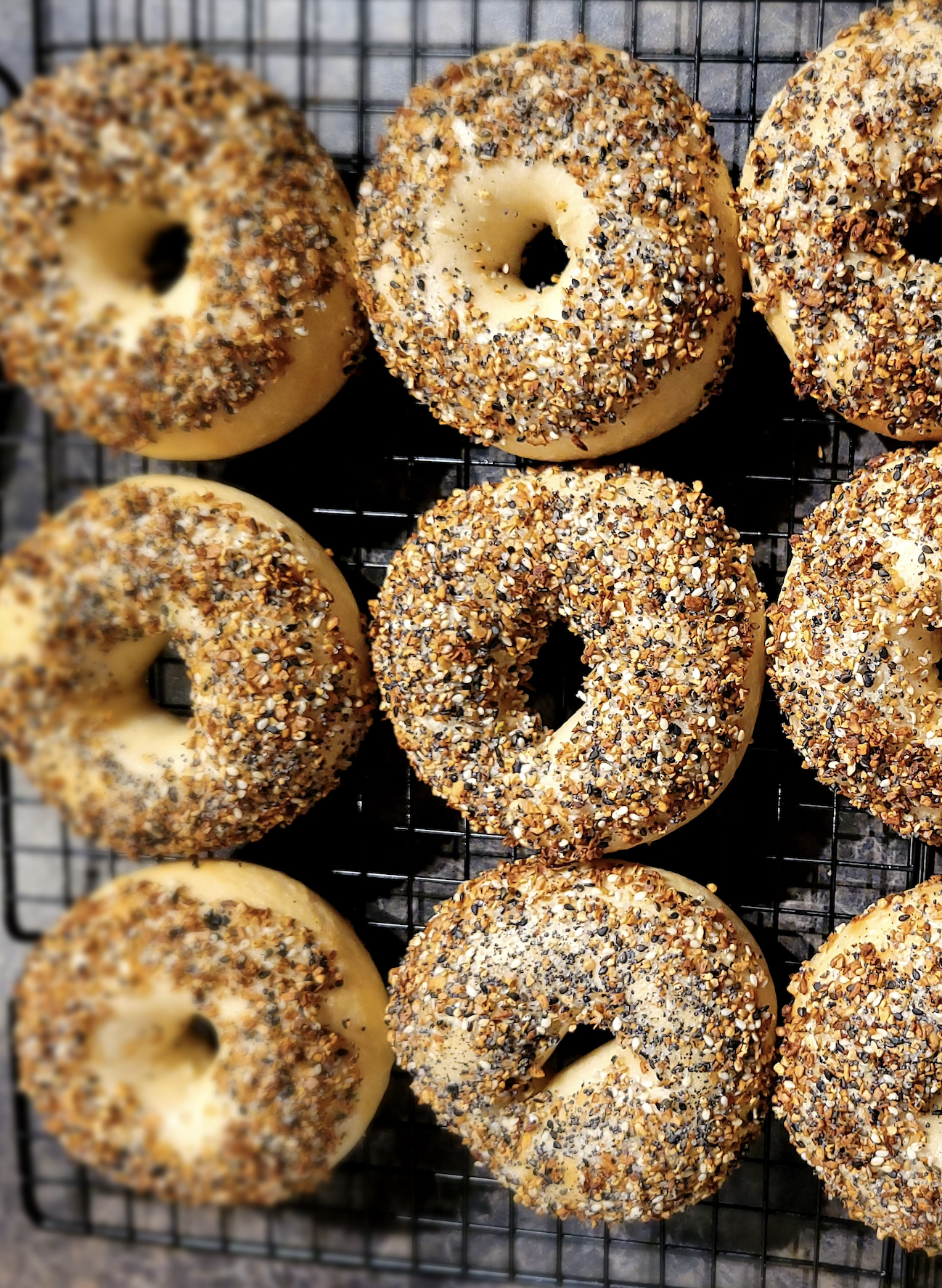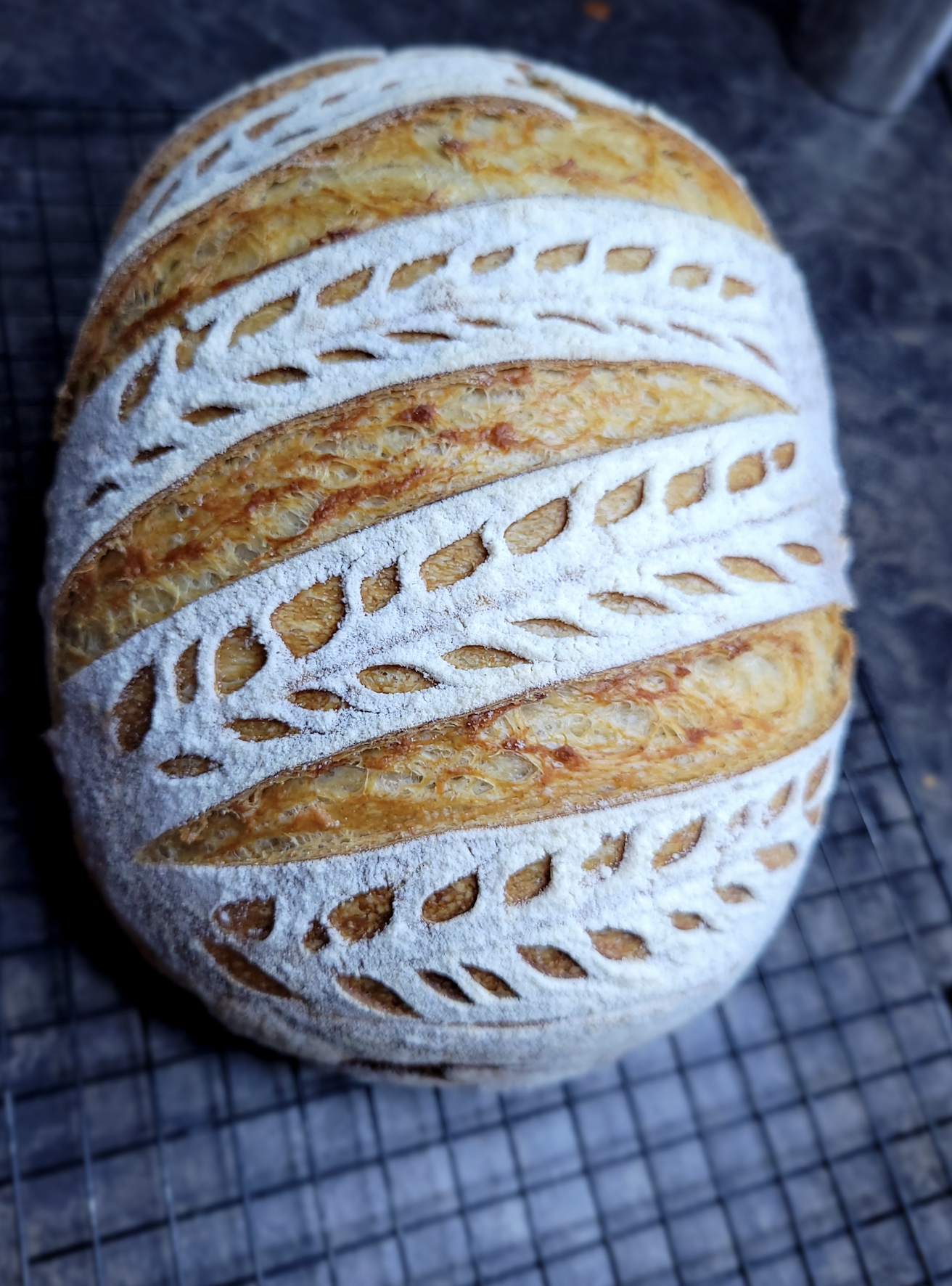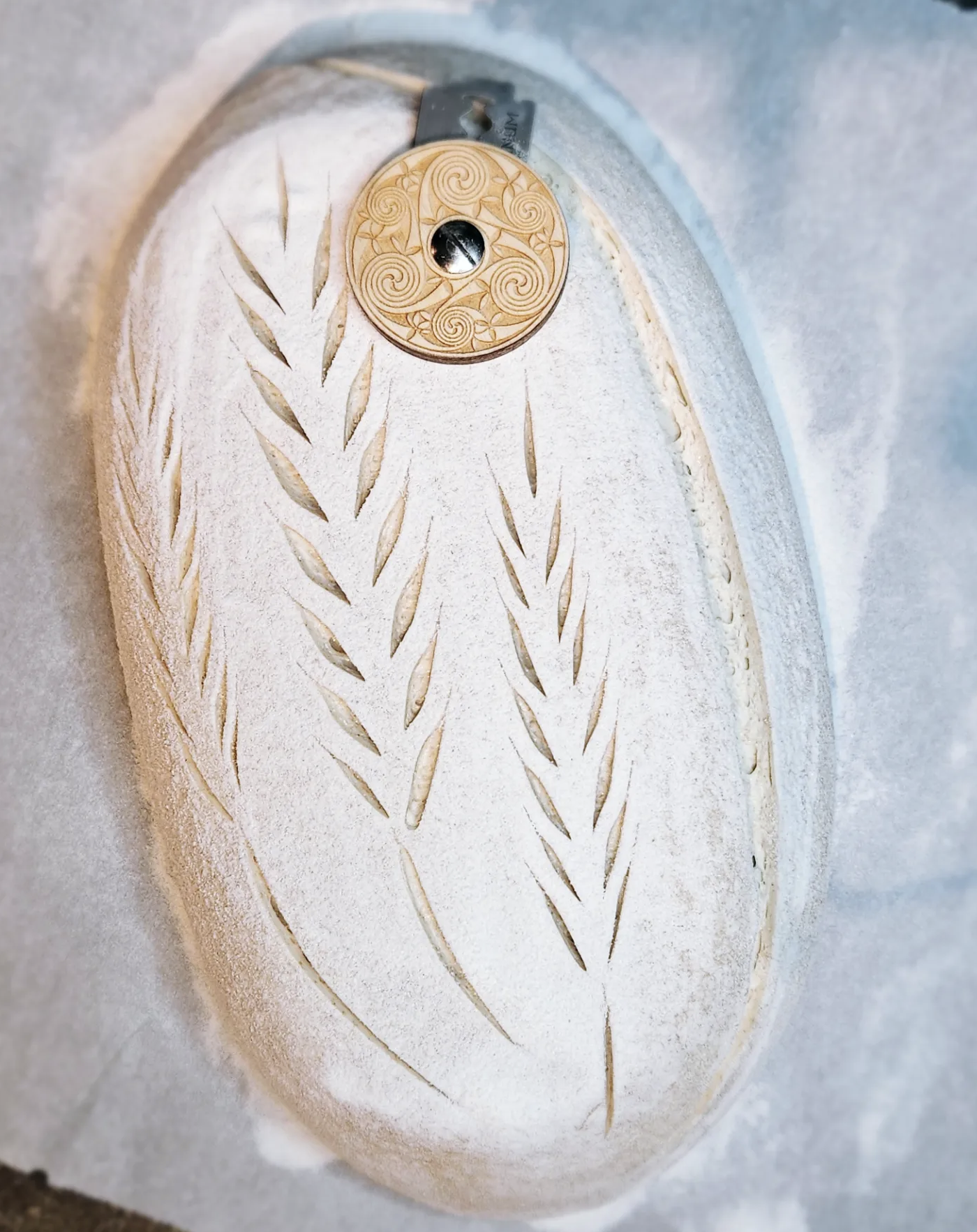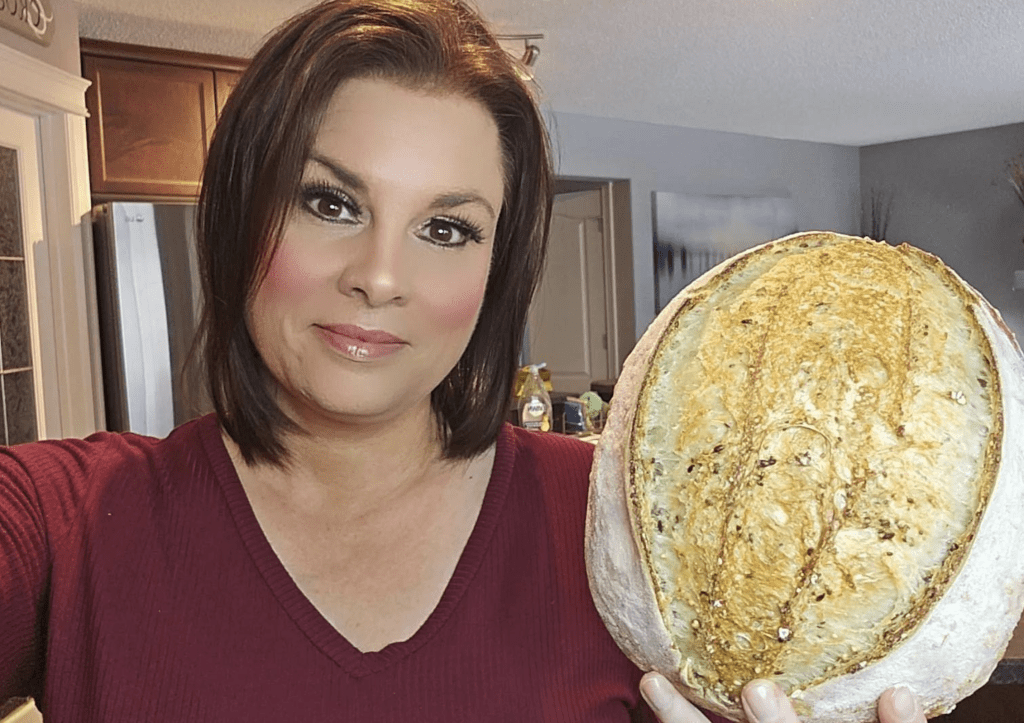Welcome to The Sourdough People, your gateway to the captivating world of sourdough baking. Today, we’re thrilled to feature an exclusive interview with Kristy, a sourdough aficionado from Edmonton, Alberta. Kristy’s story is not just about mastering the art of sourdough; it’s a journey of personal growth, health, and community. Balancing her small-town roots with a love for vibrant city life, she brings a unique blend of local appreciation and global perspective to her baking.
Kristy’s deep connection to her environment, dedication to using local ingredients, and her resilience in the face of health challenges make her story especially compelling. From battling Crohn’s disease to creating her Summit Sourdough Starter, her experiences are a testament to the transformative power of sourdough.
Follow her on Instagram @SummitSourdoughYEG to connect with her journey.
Kristy, please tell us where you are from and what you love about where you live.
I was born and raised in Edmonton, Alberta but now reside in the Edmonton suburb, Sherwood Park. Edmonton and Area is known for its vast parks, trails, and outdoor spaces, including the beautiful river valley… and our hockey team, The Edmonton Oilers. I love living in Sherwood Park, because I get the small community feel, while still being just 10 minutes away from the big city life I grew up with. I am close to some amazing, beautiful landscapes that Alberta has to offer such as Banff, Jasper, and Lake Louise. These small towns are located in the stunning Canadian Rockies of Alberta, and are renowned for their natural beauty, wildlife, skiing, and charm – everyone should go at least once.
What initially sparked your interest in sourdough baking, and how did you begin your journey?
This is a particularly long story and I will do my best to highlight the key moments in time. In 2006 after being sick for months, I was diagnosed with Crohn’s Disease. Crohn’s Disease is a form of Inflammatory Bowel Disease that has no known cause and no known cure. Crohn’s disease causes irreversible scar tissue and inflammation in the intestines, resulting in intestinal removal. I am now missing half of my intestines due to Crohn’s disease. I went through years of diet changes and food elimination to help try to cope with the pain and other unruly side effects of Crohn’s disease, which included removing bread products from my diet. I missed things like a piece of toast when I was under the weather, a waffle cream cheese on it or even a slice of pizza. I spent months living off of rice, eggs, and avocado – all soft and easily digestible foods.
One day, I discovered that I could eat real and true sourdough bread – and I didn’t experience ‘bent over’ stomach agony I was used to. I took some time to research what might be the cause and effect happening here and soon learned what we all know now – that sourdough bread when fermented properly, slowly, without the use of commercial yeast becomes much easier to digest as the protein in the flour is broken down. It became my new favorite thing to indulge here and there in a sandwich or slice of toast. But buying sourdough bread rounds became expensive and soon started to give me severe pain once again. I discovered that most grocery stores were selling what I like to refer to as “Sour-faux” … fake sourdough bread, that’s not fermented 24-48 hours, that contained commercial yeast and fake flavor additives like vinegar or malt powder – for that fake sour flavor.
It was then that I decided that the best way to take control of what I was putting into my body, was to learn as much about it as I could, and from that point forward I began (or tried!) to make all my own bread products with the basic flour, water, salt, starter. A lot of people don’t know that I first started out making myself sourdough by unsuccessfully trying to make my own starter. I spent a long (nearly 3 years) on it and I rarely baked anything edible with it, it was unpredictable, weak, and didn’t offer me the results I was looking for. I ended up quitting for over a year before I was given Summit Sourdough Starter by a family member, and that’s when everything changed. Summit Sourdough from there on became an accidental business once people could see how amazing my family’s Sourdough Culture was. It’s been an unexpected blessing that I’ll never have the words to express my gratitude for.
How has being based in Alberta added to your sourdough journey?
Living in Alberta hasn’t had too much of an impact on my sourdough journey but the local ingredients are top-notch! We have many local flour mills that offer so much more than just your regular grocery store flour – locals can find grains like spelt, ryes, red fife, and more. I always encourage my followers and customers to whenever possible, support local. They often come back to me with exciting news like finding types of flour more than whole wheat, rye, and white. A lot of people assume that the cold weather would have some significant impacts on Sourdough Baking here, but I’m a firm believer that if you have a magical starter, you’ll continue on as per normal.
How has your approach to sourdough baking evolved since you first started?
I think at first, my approach was to just get it done and get it baked. And the results spoke for themselves, honestly, and not in ways you might think! For a really long time, I baked inedible frisbees and hockey pucks. A lot of people come into the process with the notion that what they’re doing is ‘good enough’. I try to educate people that having the right tools and processes can make all the difference in your results. So, for me personally, I’ve evolved by really slowing down, being present in the process, and using high-quality tools and ingredients. I try to document each bake as best I can, to see what’s working for me and what isn’t and I make small modifications. And now, the bread I bake is continually exceeding everything I thought I was capable of doing.
Do you have a signature sourdough recipe or technique you’re particularly proud of? Can you share a bit about it?
I think the 2 recipes that people like the most are my Basic Boule recipe and my Bagel Recipe. Those are both documented on my website for anyone wanting to try them out. I use a modified version of my own Basic Boule recipe, just based on modifications I like personally – I mix my dough at a higher hydration than what is documented and with a small amount of milk added to make the crumb inside softer. For those really wanting the details – I use 240g of water and 90g of the milk (total liquid 330g) – it makes for an exceptional texture on the inside that I cannot explain. And Summit Sourdough Starter really seems to like the bit of sugar in milk.
Who are some of the people, brands, or companies in the sourdough industry that have inspired you?
First and foremost, my Summit Sourdough Ambassador team, all 15 of them! Their dedication and passion for sourdough baking have truly made a positive impact on the baking community. They spend their days baking with Summit’s heirloom starter, and showing the world how to use it and how awesome it is. They share their wealth of knowledge, tips, and inspiration through their platforms, and they help to create a supportive and engaging community. They are the absolute best and I am so thankful to know each of them! As for inspiring people and accounts; Meghan at @onyeastwefeast her bakes are always exhilarating to watch and her crumb is unbeatable. I like watching how her technique is different than mine, and the bread flavors she creates are beyond creative. Chris with @sourdoughbrooo – he reached an amazing milestone last year by hitting 1000 bakes with his Summit Sourdough Starter, and if you watch his videos, his free-hand artistic scoring ability is unbelievable!
What are your must-have tools or favorite equipment for sourdough baking, and why?
Summit Sourdough Starter – I love that our starter has helped thousands of people worldwide from beginner to expert get baking in just 7 days!
Weck Jars – I’m a huge fan of the 1L and 1.5L tulip jar. It’s easy to mix your starter and bonus it comes with a loose fitting lid.
Le Creuset – I use the Le Creuset bread oven to bake all my loaves in and it has been a game changer for me personally, especially when it comes to achieving an ear. It’s the best vessel I’ve ever used.
DOAP @getdoap – All bakers need one, your hand cleanup will be a breeze -it solves a messy problem we all have. I have 3 different colors myself.
A high-quality bread lame – some favorites here are the Wire Monkey POCO and Goose Lames, they have exceptional craftsmanship and are easy to hold with brilliant safety design.
Cambro – I use their 12-quart tubs with lids to store my flour. People always go crazy for them when they see them on my Instagram stories.
How do you source your ingredients, and do you have any specific preferences or tips regarding flour, water, or salt?
I try to source my ingredients locally, as 99% of the baking I do is for my household. A lot of people are interested in what I use to bake my bread and feed my starter. My favorite flour to use to feed my own summit sourdough starter is Great Plains Strong Bakers Flour – I buy this in 20kg bags locally from Costco. I also use this bread flour to bake with and no longer buy All-purpose flour. I also like to use the Anita’s Organic Mill 60/40 bakers blend. I don’t bake or cook with table salt, I only use fine ground sea salt in everything that I cook. It tastes way better and it’s easy to grab at Costco when I’m grabbing my flour. As for water – we have exceptional water here, so I use water right from my tap.
Can you share a particularly challenging experience you’ve had with sourdough baking and how you overcame it?
No luck coming up with a great answer for this. My entire first 3 years were a total fail and I attribute it to the homemade sourdough starter I had. The homemade starter was so bad in fact, I quit baking (well trying to bake!) sourdough for almost a year. I wouldn’t try again until I was given the family sourdough starter heirloom, and it was then, that all my results changed, literally overnight. It’s why now, I am a huge believer in using an established starter.
What do you enjoy most about baking sourdough, and how does it impact your daily life?
For me learning how to make sourdough was a very personal journey. As I mentioned, I cannot eat store-bought bread so it was really a labour of love, out of pure necessity. I truly believe that it’s helped influence various aspects from my routine to overall well-being and gut health. It’s an intentionally slow process that demands patience and mindfulness. Waiting for the dough to rise or proof… fostering a more patient and present mindset in your daily activities. No 2 bakes are alike, and it forces a bit of a ‘go with the flow’ mindset. One day you might bulk ferment for 10 hours, the next it might only take 7. I believe moving through the process also allows us to connect with very basic ingredients such as flour, water and salt which for me deepens my appreciation for the food I consume and its impact on my well-being.
How do you balance tradition and innovation in your sourdough baking practices?
I don’t think I’m innovative at all. I’m very much by the book, don’t break the process kind of person. If I have to pick which side of the road I’m on, definitely more on the traditional side.
Have you noticed any new trends or innovations in sourdough baking recently?
The 7-8 minute score!!! Everyone should be doing it, especially if you are crazy for ears. This is a new trend that when I saw I gave it a whirl and I really enjoyed the results.
What are some common misconceptions about sourdough baking that you’ve encountered, and how do you address them?
I could write a small novel on this question. I believe that because Sourdough baking has become increasingly popular a lot of misconceptions (misinformation) have also emerged. I think I’m pretty straightforward when I do Q and A sessions online with my followers. I just answer these questions as best as I can and supply the evidence.
Misconception: there’s a perception that sourdough baking is complicated and only for experienced bakers. It’s true, sourdough requires some attention and understanding of the fermentation process but beginners can successfully make sourdough with practice and a willingness to learn. As I say: process, process, process.
Misconception Sourdough Requires Special Flour: some believe that you need specialty flours or organic ingredients to make good sourdough. Sourdough can be made with common flours like all-purpose or bread flour. While experimenting with different flours can be interesting, it’s not necessary for basic sourdough success. My preference though, is to use bread flour that is high in protein content as it helps gluten strength and development, along with spring in the oven.
Misconception, Sourdough Is Always Sour: many people associate sourdough with an extremely tangy flavor. Sourdough doesn’t have to taste sour! The sourness of sourdough can vary depending on factors like fermentation time, temperature, and the type of starter used. Sourdough can be adjusted to suit individual taste preferences, ranging from mildly tangy to more pronounced.
Misconception, Sourdough Starter Maintenance Is Tedious: there’s a perception that maintaining a sourdough starter involves constant attention and is time-consuming. Sourdough starters are resilient and can be quite forgiving. With regular feedings and proper storage, starter maintenance becomes a manageable 5 minutes per day.
In your opinion, what is the most underrated aspect of sourdough baking?
The most underrated aspect of sourdough is its health and nutrition benefits and its impact on digestion and nutrient absorption. I don’t think that most people know that the fermentation process involved in making sourdough helps break down certain compounds in the flour, such as phytic acid (aka phytate) and gluten, which can be challenging for many people to digest. So, as someone with a digestive disease, this was important to me to learn about how it would impact me personally. A little science lesson I learned years ago while teaching myself all about Sourdough; the fermentation process helps to break phytic acid in the bread. Phytic acid bonds to certain grains and seeds and inhibits the absorption of important minerals like calcium, zinc, magnesium, and iron. So sourdough bread, when prepared and fermented properly, is significantly healthier because the phytic acid has been broken down, allowing your body access to use and absorb those minerals and nutrients. Another lesser-known fact is that sourdough has a lower glycemic index compared to other types of bread. The slow fermentation and the presence of organic acids can slow down the digestion and absorption of carbohydrates, leading to a more gradual rise in blood sugar levels, versus a sudden spike. So it’s got the leading edge when it comes to health.
Are there any books, videos, or online resources you’d recommend to those wanting to learn more about sourdough baking?
People are always more than welcome to access the resources I’ve put together on summitsourdough.com or any of the tutorials I’ve saved on my Instagram highlights. But – a couple of other people that I absolutely adore and love to follow, who have amazing tips and tricks: Jack Sturgess @bakewithjack and Elaine Boddy @elaine_foodbod. The entire community is filled with such talent, and it’s easy to see that no two people do it the same.
What advice would you give to someone just starting out with sourdough baking?
Don’t start with baking boules/batards right off the bat! I always say, this is one of the most complicated things to learn – start with something easy first like Bagels or English Muffins. Make sure you learn how your sourdough starter behaves in your environment. How long does it take to peak? How does it like to be fed? How long will it hold active status for? Once you understand how the starter behaves in your environment it makes it much easier to time feedings for recipes.
How do you engage with your followers and the sourdough community on social media? What’s your style?
As most people will tell you, I am answering DMs and questions about 8 to 10 hours per day in between running my business and my personal life. I answer every single question sent to Summit Sourdough, and while it’s been taking me a bit longer to reply recently, I enjoy and appreciate those personalized interactions. The celebrations, the thank you’s, the pictures – I love it all. It keeps me connected and I feel right at home, doing what I love.
Have you participated in any collaborations or community events related to sourdough baking, and what was your experience?
I have done several collaborations – and some are still in the process of brainstorming. All in all, those have always been very well received and I enjoy working with and supporting other small businesses. I’m big on supporting small businesses!
What’s your favorite sourdough recipe to bake for yourself, friends, or your loved ones?
For myself, it has to (easily!) be Sourdough Cinnamon Buns – the difference in flavour and texture compared to a yeast one is nothing like you’ve ever experienced; plus cream cheese icing. Friends will often ask for my sourdough bagels because they make the best sandwiches. And my family loves to use my batards for the best panini sandwiches (or grilled cheeses) you’ve ever eaten.
Do you have any tips or suggestions on how to manage a healthy sourdough starter culture?
This is quite a controversial subject in the land of sourdough – the reason being is that everyone does it differently. My biggest tip is to figure out what your starter likes. Some starters like to be fed at 1:1:1, some like 1:2:2 etc. But if I had to throw the gloves down and fight for one tip only, it would be to invest in a digital kitchen scale. I am all for precise measuring and feeding and you won’t achieve that by doing it in cups (I made a cool video on it on Instagram about why!). I have fixed hundreds of starving starters all because they were being “eye-ball” fed or fed using cups. If you really want your starter to perform, feed it accurately by weight in grams and give it a high-quality, high-protein bread flour. As they say, you are what you eat, and feeding your starter the cheapest flour you can find, will result in lackluster results!
Do you have any upcoming projects or plans related to sourdough baking that you’re excited about?
I do! 2024 will hopefully see the Summit Sourdough Brand Reusable / Sustainable product line expand into a few more products for all kitchens – not just sourdough ones. These for now are on the down-low as we say here. I’m also planning on releasing my first eBook – which everyone has been so patiently waiting for and was delayed last year due to health problems. I am looking forward to sharing all the details with everyone as soon as possible. I’ve got some great things in store for everyone.
What do you hope to contribute or be remembered for most in the sourdough community?
Firstly, I hope to contribute my knowledge and experience with fellow enthusiasts, whether they are beginners seeking guidance or experienced bakers looking for new insights and ideas. I want to be remembered for creating a supportive and collaborative learning environment where we can all celebrate not only our wins, but also our failures. I hope to inspire others to try baking with Sourdough and I hope that by contributing my skills, ideas, and passion it will lead to creating a vibrant and supportive space for all bread enthusiasts to thrive.
Can you describe a moment when you felt particularly proud or fulfilled in your sourdough baking journey?
A few milestones that stick out with me here are: the first one was being recognized by CBC Nationally via a digital print article they wrote and then guest appearing on a Live 5 pm drive home CBC Radio show. That was not only the coolest thing I’ve ever done, but also one of the scariest things I’ve ever done. For those who know me well, I do not like to be the center of attention AT ALL, and to know that thousands of people we’re listening to me chit-chat sourdough was a very intimidating feeling.
The second major milestone for me was launching my sustainable and reusable accessories line. This was particularly important to me because I got to support local once again. My reusable and sustainable baking line is Made in Canada, and I employ a small business out of the East to do my sewing for the Reusable Banneton/Bowl Covers. The other covers I offer, I employ a local retired senior/seamstress. For me it’s about shared success and relationships, not just about transactions. So it has been especially fulfilling to me to give back locally to other small businesses right here in Canada.
If you could give one piece of advice to your past self when you started sourdough baking, what would it be?
Trust the process, ask questions, and use a tried and true sourdough bread starter culture.
Is there anything else Kristy that you would like the community to know about you or things you would like the readers to potentially purchase or subscribe to?
I encourage everyone to join us on the Summit Sourdough Instagram page – where I share baking tips, tutorial,s and recipes. I’m available for questions too – most of the time! For those who are new and looking to embark on a sourdough baking adventure but are feeling a bit overwhelmed, I do offer Summit Sourdough starter for sale and it is typically ready to go in 7 days, all instructions included! They also have access to my sourdough recipes, resources, starters, accessories, and more 24/7 at summitsourdough.com!
Closing Thoughts
We hope you are as inspired by Kristy’s story as we are here at The Sourdough People. Her dedication to the art of sourdough baking, coupled with her personal story of resilience and innovation, is a beacon for bakers and enthusiasts alike. For more insights and inspiration from Kristy, we encourage you to visit her website at summitsourdough.com and follow her journey on Instagram @SummitSourdoughYEG.
As part of The Sourdough People, we invite you to join our vibrant community. Follow us on Instagram @sourdoughbread.ca and subscribe to our email newsletter for the latest in sourdough news, tips, and stories from bakers around the globe. If you have a sourdough story to share, we would love to hear it! Please submit your experiences and tales using our intake form on the website.
Together, let’s continue to explore, learn, and celebrate the rich world of sourdough baking.
